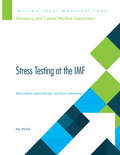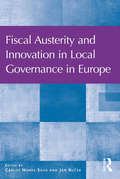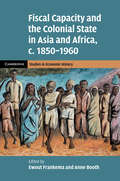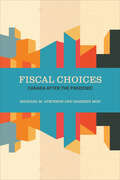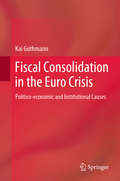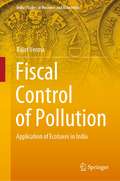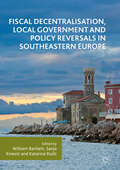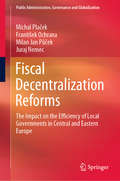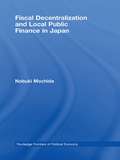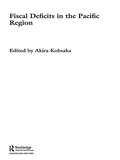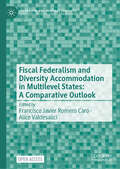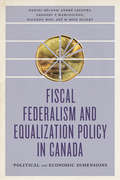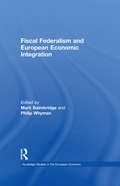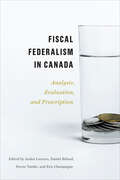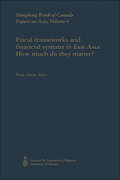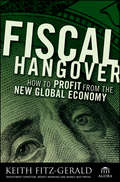- Table View
- List View
Fiscal Affairs Department How-To Notes (Departmental Papers)
by International Monetary FundA report from the International Monetary Fund.
Fiscal Austerity and Innovation in Local Governance in Europe
by Carlos Nunes Silva Ján Bu?ekFollowing the financial crisis and subsequent impacts of economic slowdown and austerity, the emergence of new local governance models and innovation is a very timely issue. The same goes for identifying new types of funding schemes and fiscal models prompted by austerity with the reduction in financial resources for local governments. This book offers a broad perspective on some of the organizational and financial problems faced by cities and local governments across Europe and analyses the reactions and reforms implemented to address current economic and public finance conditions. The geographical coverage of the case studies, multidisciplinary background of the contributing authors and focus on a multiplicity of issues and challenges that confront local governments, not just financial issues as is often the case, means this book is relevant to a wide readership. The book is written for post-graduate students, advanced undergraduates, and researchers in the multidisciplinary field of local government studies (Public Administration, Geography, Political Science, Law, Economy and Sociology), as well as practitioners working in local government institutions.
Fiscal Capacity and the Colonial State in Asia and Africa, c.1850–1960 (Cambridge Studies in Economic History - Second Series)
by Anne Booth Ewout FrankemaThis book examines the evolution of fiscal capacity in the context of colonial state formation and the changing world order between 1850 and 1960. Until the early nineteenth century, European colonial control over Asia and Africa was largely confined to coastal and island settlements, which functioned as little more than trading posts. The officials running these settlements had neither the resources nor the need to develop new fiscal instruments. With the expansion of imperialism, the costs of maintaining colonies rose. Home governments, reluctant to place the financial burden of imperial expansion on metropolitan taxpayers, pressed colonial governments to become fiscally self-supporting. A team of leading historians provides a comparative overview of how colonial states set up their administrative systems and how these regimes involved local people and elites. They shed new light on the political economy of colonial state formation and the institutional legacies they left behind at independence.
Fiscal Choices: Canada after the Pandemic (The Johnson-Shoyama Series on Public Policy)
by Michael M. Atkinson Haizhen MouThe COVID-19 pandemic revealed that governments can quickly respond to a fiscal crisis without becoming mired in unproductive wrangling. But the pandemic has also revealed the limits of traditional policy instruments in stabilizing the economy, controlling inflation, and fostering economic growth. Fiscal Choices sheds light on the economic dimensions of COVID-19 and examines the state of Canada’s fiscal policy and fiscal health following the pandemic. The book covers a cluster of key fiscal policy topics: the overall capacity of government, the growth of inequalities, the management of sovereign debt, and the troubled institutions of federalism and parliamentary government. The book draws upon candid, in-depth interviews with over 70 former and current politicians, public servants, and academic experts who aim to establish a sustainable future within an accountable political system. The book argues that although those who are entrusted with the instruments of power are intelligent and well meaning, they are reluctant to take risks or abandon well-known, if poorly performing, formulas. It concludes with a set of predictions and prescriptions rooted in a realistic interpretation of Canada’s political economy. Ultimately, Fiscal Choices presents a sober assessment of federalism and parliamentary government as instruments of democratic accountability.
Fiscal Consolidation in the Euro Crisis: Politico-economic and Institutional Causes
by Kai GuthmannThis book sheds new light on if and why, between 2009 and 2015, European governments succeeded or failed in initiating and actually realizing some of the farthest-reaching austerity plans in modern history. The author analyzes the economic and political context and the underlying causes of austerity and economic adjustment packages during the Euro crisis. In doing so, he shows that austerity has its roots in an institutional mismatch between capitalist diversity in the Eurozone on the one hand, and an ill-conceived common economic regime on the other. In this context, austerity trumped politics, and even democracy itself. The book will appeal to scholars of political science and comparative political economy, as well as governmental policymakers and practitioners in the finance sector.
Fiscal Control of Pollution: Application of Ecotaxes in India (India Studies in Business and Economics)
by Rajat VermaThis volume analyses the process and structure of ecotaxes in India to bring forth its rationale, application and incidence on emerging environmental problems on the backdrop of the environmental issues confronted by the Indian economy. Being at infant stage in India, the concept of ecotaxes is plagued with large empirical difficulties. This book provides a holistic understanding of the complexities in the design and implementation of these fiscal instruments at the country level. After elaborating on the theory, history of its applications, the book provides an innovative methodological exercise. It examines the adequacy and relevance of ecotaxation in the Indian context, along with ensuring that the distortions due to the proposed levy are minimised. The incidence of these taxes on the households, the double dividend hypothesis and the effect on competitiveness of the producer are a few of the core themes elaborated upon in this book. This is demonstrated through a linear general equilibrium framework of Environmentally extended Social Accounting Matrix (E-SAM).The book provides material for the researchers and graduate students on the methodological structure of eco-taxes. The proposed methodological intervention could be utilised by the researchers who wish to analyse the macroeconomic impact of any tax through the framework of Social Accounting Matrix (SAM). Additionally, the process as well as the implications and nuances provided in the book will assist the policy makers to design innovative policies for dealing with environmental issues. The volume also has something for the practitioners by helping them comprehend various effects of these instruments on different stake holders of the economy and thus will be useful as a policy prescription. The three policy scenarios analysed in this study could be considered by the policymakers while attempting to design these instruments in the Indian context and thus ending the extensive reliance on the age old and grossly ineffective Command and Control (CAC) Policies.
Fiscal Coverage in the Countries of the Middle East and Central Asia: Current Situation and a Way Forward
by Daria ZakharovaA report from the International Monetary Fund.
Fiscal Cycles in the Caribbean
by Juliana Dutra AraujoA report from the International Monetary Fund.
Fiscal Decentralisation, Local Government and Policy Reversals in Southeastern Europe
by William Bartlett Sanja Kmezić Katarina ĐulićThis edited collection provides a comprehensive geographic and chronological overview of the decentralisation processes in the successor states of former Yugoslavia and Albania during their transition and EU integration years, from 1990 until 2016. These countries present a unique laboratory for the analysis of economic, social and political change, having traversed armed conflicts, dramatic economic and political changes, and EU pre-accession processes involving deep institutional reform. They have also endured the Eurozone crisis, which has led to high levels of unemployment, wide fiscal gaps and dangerously high levels of indebtedness. Observing the quarter century-long transition from socialism to capitalism through the prism of decentralisation sheds new light on studying the political economy of the region and the current status of the individual countries in terms of economic development and their EU integration progress. The contributors enrich the wider literature on fiscal decentralisation in transition countries by exploring several broad questions on democratisation, the political economy of post-communist transition, the role of external actors in policy transfer and the issue of financial stability in the post-crisis period.
Fiscal Decentralization Reforms: The Impact on the Efficiency of Local Governments in Central and Eastern Europe (Public Administration, Governance and Globalization #19)
by Juraj Nemec Michal Plaček František Ochrana Milan Jan PůčekThis book examines the impacts of fiscal decentralization reforms on the efficiency of local governments in Central and Eastern European (CEE) countries. By offering a comparative perspective and by applying econometric methods and regression models, it analyses various reform trajectories and their effects on individual CEE countries. Furthermore, the book discusses input and output indicators for evaluating the efficiency of municipalities. Readers will learn about the common features of these countries, the impact of path dependence, and future prospects for decentralization reforms. In closing, the book discusses modern management and administration methods, opportunities for cooperation between municipalities, co-creative service delivery, and other measures that could improve the efficiency of public service provision.
Fiscal Decentralization and Development
by Hiroko UchimuraAn in-depth analysis of the fundamental role that decentralization plays in developing countries, using detailed statistical data to examine the actual fiscal structure between tiers of government, and the effects of decentralization at the local, national and international levels.
Fiscal Decentralization and Local Public Finance in Japan (Routledge Frontiers Of Political Economy Ser. #Vol. 107)
by Nobuki MochidaThe intergovernmental fiscal issue is highly relevant given the worldwide movement toward more decentralized governance in both industrial and developing countries. Over the course of five decades Japan has developed a robust system of decentralized governance. This book investigates fiscal decentralization and local finance in Japan wi
Fiscal Decentralization in India: An Outcome Mapping of State Finance Commissions
by V N AlokThis book presents an in-depth analysis of key recommendations of the consecutive state finance commissions (SFCs) across states of India in the local and national perspective. It reviews the working of SFCs and their critical role in strengthening local governments, both Panchayats and municipalities in the various states. The volume attempts to identify some of the emerging issues related to the efficacy of SFC in fiscal decentralization. It appraises nearly eighty SFC reports and actions taken thereon by the respective State Governments with contextual analysis.
Fiscal Deficits and Current Account Deficits
by Michael Kumhof Douglas LaxtonA report from the International Monetary Fund.
Fiscal Deficits in the Pacific Region (Routledge Studies in the Modern World Economy #Vol. 44)
by Akira KohsakaFiscal policy is an incredibly important tool for governments across the world, with many countries facing dilemmas in crafting fiscal policies to meet changing demographic needs, greater demands for social welfare and sudden spending due to shocks such as terrorism. This important book looks at fiscal policy in the Asian Pacific economies and with a broad array of contributors will be a useful tool to students, researchers and professionals working in international economics and finance.
Fiscal Dimensions of Sustainable Development
by Sanjeev Gupta Kevin Fletcher Michael Keen Benedict Clements Luiz De Mello Muthukumara ManiA report from the International Monetary Fund.
Fiscal Federalism
by Robin Boadway Anwar ShahThis book provides a comprehensive account of the principles and practices of fiscal federalism based on the currently accepted theoretical framework and best practices. The traditional topics of assignment of responsibilities, intergovernmental fiscal arrangements, fiscal competition, and grants are covered in a unified framework with reference to actual practices followed in federations around the world. Special issues such as local government and the implications of natural resource issues are considered along with emerging issues such as governance, corruption, and the effect of globalization and the information revolution on the nation state. The treatment is non-technical and suitable for a wide variety of audiences, including scholars, instructors, students, policy advisors, and practitioners.
Fiscal Federalism and Diversity Accommodation in Multilevel States: A Comparative Outlook (Federalism and Internal Conflicts)
by Alice Valdesalici Francisco Javier Romero CaroThis open access edited book connects two strands of federal studies, fiscal federalism, and diversity accommodation, to answer two closely interrelated questions. The first of these is to what extent has the need to accommodate diversities determined financial relations and their evolution? The authors answer this question by conducting a thorough investigation of the types of diversity that drive such evolution. The second question is does fiscal federalism have a broadly positive or negative impact on the accommodation of diversities, by producing institutional solutions that either integrate a federal system or pull it apart? Through contributions from experts in law, economics, and political science, the book uses a series of case studies to establish a theoretical framework for exploring the relationship between fiscal federalism and diversity accommodation. The authors lay the groundwork for a comparative study of this relationship in multilevel states.
Fiscal Federalism and Equalization Policy in Canada: Political and Economic Dimensions
by Gregory P. Marchildon André Lecours Daniel Béland Haizhen Mou M. Rose OlfertFiscal Federalism and Equalization Policy in Canada aims to increase public understanding of equalization and fiscal federalism by providing a comparative and multidisciplinary perspective on the history, politics, and economics of equalization policy in Canada. The authors provide a brief history, an analysis of the politics of equalization as witnessed over the last fifteen years, and a discussion of key economic debates concerning the role of the program and its effects. They also explore the relationship between equalization and other components of fiscal federalism, particularly the Canada Health Transfer and the Canada Social Transfer. The result is an analysis that draws from the best scholarship available in the fields of economics, economic history, political science, political sociology, and public policy.
Fiscal Federalism and European Economic Integration (Routledge Studies in the European Economy)
by Mark Baimbridge Philip WhymanThe pace of economic integration amongst European Union (EU) member states has accelerated considerably during the past decade, highlighted by the process of Economic and Monetary Union (EMU). Many aspects of the EU's apparatus, however, have failed to evolve in order to meets these new challenges. This book explores the issue of fiscal federalism within the context of EU integration from theoretical, historical, policy and global perspectives. It contrasts the pace of integration amongst EU member states with the failure of financial and administrative apparatus to evolve to encompass fiscal federalism, i.e. the development of a centralised budgetary system. This impressive collection, with contributions from a range of internationally respected authors, shall interest students and researchers involved with European economics and economic integration. Its accessible style will also make it extremely useful to policy-makers and professionals for whom European economic integration is a daily topic of conversation.
Fiscal Federalism in Canada: Analysis, Evaluation, Prescription
by André Lecours Daniel Béland Trevor Tombe Eric ChampagneFeaturing insights from some of the top specialists in the country, Fiscal Federalism in Canada unpacks numerous complexities of fiscal federalism in Canada. The book features key regional and provincial perspectives, while taking into account Indigenous realities, the three territories, and municipal affairs. The contributing authors go beyond the major federal transfers to examine the financing of education, cities, infrastructure, and housing. This volume shows that fiscal federalism is much more than simply an aggregate of individual programs and transfers. It highlights the role of actors other than the federal and provincial governments and recalls the importance of territoriality. The book pays close attention to the political dimension of fiscal federalism in Canada, which is at the heart of how the federation functions and is essential to its governance. Fiscal federalism is central to the funding of critical programs through intergovernmental transfers, but it is also the focus of political debates on territorial redistribution. In tackling essential questions, Fiscal Federalism in Canada contributes to the so-called second-generation fiscal federalism literature, taking stock of the critical sociological and political issues at its core.
Fiscal Federalism in Theory and Practice
by Teresa Ter-MinassianA report from the International Monetary Fund.
Fiscal Federalism in the European Union (Routledge Studies in the European Economy #Vol. 9)
by Amedeo Fossati Giorgio PanellaTo what extent should local and regional governments in the European Union be allowed to determine their own fiscal policies?This book explores the core issues of fiscal federalism in the European context. It combines theoretical and empirical analysis in addressing such questions as:* what sort of fiscal federalism is appropriate in the European Community* what are the dangers of more centralization* what are the costs of greater decentralization
Fiscal Frameworks and Financial Systems in East Asia: How Much Do They Matter?
by Wendy DobsonThis volume addresses the two key financing constraints that firms must face: taxation and finance. The taxation analysis focuses on how tax systems in selected Asian economies affect growth and the relative competitiveness of foreign and domestic enterprises. It outlines key features of the systems and provides a set of guidelines for potential foreign investors as to how these systems compare with each other (and with those in Canada and the United States) and predict future developments (including financial innovation and the internet).The study of financial frameworks focuses on corporate finance and analyzes the relationship between financing patterns and the level of development of securities markets and financial liberalization in the region. It focuses on the issue of how firms finance investments and the extent to which they depend on retained earnings and funding obtained through the market.Both studies include Japan, China, Hong Kong, Taiwan, Singapore, Korea, Indonesia, Malaysia, Thailand and Philippines. Both also consider the implications of taxation for savings and investment flows in domestic economies and across borders-and the implications of public sector demand for savings for corporate financing constraints.
Fiscal Hangover: How to Profit From The New Global Economy (Agora Series #9)
by Keith Fitz-GeraldThe rules of making money have changed-forever With the collapse of investment banks, trillion-dollar-plus government bailouts, and the Dow plunging like a rock, it's never been more important to understand-and actually profit from-the "new rules." Fact is, Fiscal Hangover, will give you an investing blueprint that will allow you to profit from the changing global economy. For the first time in 200 years, American consumers are stepping down from their position as the driving force behind the world's economy. In Fiscal Hangover, Keith Fitz-Gerald analyzes the declining power of the American consumer and introduces you to the resulting investment opportunities. Without question, the American consumer and the United States government have provided the rest of the world with liquidity in the form of cheap capital and abundant debt. But in light of recent economic events, the rules of the game have changed and that means you must change with them-if you intend on securing your financial future. Unlike most of today's finance books that simply examine the end of the American Empire, Fiscal Hangover shows you how to prepare for the fall, effectively allocate your investments, and thrive in the new global economy. This book offers specific analysis and concrete actionable steps for individual investors interested in grabbing their fair share of what will be the greatest wealth creation in the history of mankind. Examines our current financial situation and offers practical investment advice to overcome the challenges you'll face Analyzes the declining power of the American consumer and introduces you to the resulting investment opportunities Details new investing benchmarks and discusses why the old ones no longer work Explores big picture economic issues that will affect your individual investment endeavors The coming years may hold the greatest investment opportunities of our times, but in order to take advantage of this you'll need the insights that can only be found in Fiscal Hangover.
